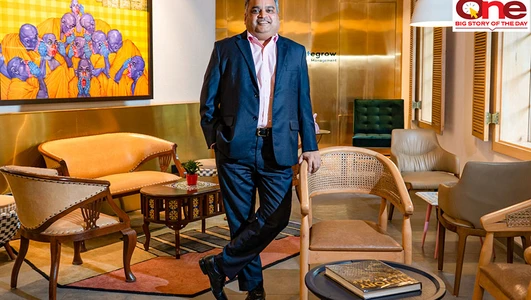A construction, banking and investment veteran is taking a stab at overhauling a broken real estate sector by cementing it with loads of technology and accountability. Will Ram Yadav’s audacious gambit pay off?

Mumbai, 1999. The choice was between Arthur Andersen and Shapoorji Pallonji. And for the young Mumbai lad who had just cleared his MBA in finance, it was definitely a no-brainer. Swanky building, luxurious office, a storied brand, and an opportunity to start a career with a marquee multinational accounting firm was undoubtedly a dream start for Ram Yadav. But the dream got interrupted. Yadav’s father brutally injected some realism into his son’s fantasy world. “Who are you going to work with?” he asked. “Arthur Andersen,” replied Yadav, who was enamoured with the American brand. Not satisfied with the reply, his father kept probing. “I asked who, I didn’t ask which brand,” he said sternly. It was turning out to be a difficult question for Yadav.
His father, though, was convinced that he had popped up an easy query. The answer too, he explained to his son, was straightforward. “You don’t need to break any sweat,” he underlined, explaining what all his lad must look for to help him take a call about his maiden job. The other offer with Shapoorji Pallonji was working as an EA (executive assistant) to director of operations. An IITian who also added heft to his role by graduating from IIM-Calcutta, the director had all the qualifications that would have helped a rookie learn the craft. “If you know what all you should not do, then clarity on what to do comes as easy as a breeze,” his father advised. “Work in a constructions’ company, get your hands dirty, and learn to build from scratch,” he suggested. The son dutifully obliged, and joined Shapoorji Pallonji in 1999.
Yadav knew what to do, but he didn’t know what all he could be asked to do. Just a few months into his job, he was sent to audit a real estate project in Nashik, Maharashtra. Staying true to his new-found belief—of knowing what not to do—the young professional called up his director. “The project will get delayed,” he said in his blunt assessment. Impressed by his honest evaluation, the director unwittingly added stress into the life of his disciple. “Stay there. Don’t come back. Find out what’s wrong and fix it,” was the command from the captain, who knew that the project might get languished, but nobody in the team mustered the courage to wave the red flag and inform him.
Yadav’s life went for a toss. The project site—the factory on the outskirts was being designed to make seating gear for Mahindra & Mahindra, including the yet-to-be-launched Scorpio—was nothing less than a jungle. Yadav battled the odds for a few months and came back. “It changed my life,” he recalls. “I saw closely how real estate projects work and the potential problems,” he adds. And if the young lad thought that he would be duly rewarded, he was right. His boss, though, had a different kind of prize in his mind. “Now you know very well how to manage stressed projects,” he said. “So, from now on, this is what you will deal with,” came the reply. That’s how stress, Yadav underlines, got added to my life. “And it kept haunting me.”
Fast forward to early 2015. Stress of an extreme kind was knocking on the doors. It had been nine months since Yadav joined Edelweiss financial services as the chief executive officer of its real estate practices. In his first stint as an investment professional, the seasoned real estate official had taken an inordinate time to dispense his first loan. And finally, he sanctioned Rs5 crore, and disbursed Rs1 crore in the first instalment. “I couldn’t sleep for an entire week,” he recounts.

The reason for his sleepless nights was not hard to fathom. During his last stint of almost a dozen years at the BSE-listed realty firm Orbit Corp, Yadav had seen from close quarters what ails the real estate sector. One of the early employees of the company—Yadav joined Orbit in 2002—he diligently climbed the corporate ladder to become joint CEO in August 2013. During his long tenure, he guided the company by following his unwavering ideology of ‘what not to do’.
Yadav explains what Orbit decided not to do. “We said we will not get out of the island city of Mumbai,” he says, underlining the first decision that formed the core of the company in terms of operations. Second thing on the ‘not to do’ list was new projects. The company identified its distinct niche. “We said we will only do redevelopment. We will only select old, dilapidated buildings,” he points out. And there were many such structures. “I remember there were around 19,642 buildings that were declared dilapidated at that time,” he recounts. The move worked, the company grew at a fast clip, and then success extracted its price. “We started doing what we decided not to do,” says Yadav, who saw the writing on the wall, and quit in May 2014. A month later, he joined Edelweiss.
Nine months into the job, Yadav was still figuring out the right way to wear the financer’s cap. And when he did, stress followed him. “What if the builder runs away after taking Rs1 crore, what if he delays the project and misappropriates the money, what if the project never gets off the ground… all kinds of wild and realistic possibilities started to torment the seasoned realty player, who was experiencing trouble in making the transition from real estate to the financing world. “I used to religiously go to the site and monitor the work,” he recalls, adding that he became a butt of jokes among his colleagues. “He is the first financer who gives money, and adds stress to his life,” was the most common taunt. Yadav decided to turn deaf, again one of the things that he added to his ever-evolving ‘what not to do’ lis
Two years ago, in the midst of the pandemic, Yadav quit Edelweiss in July 2020. And two months before that, in May, something radical happened. The Bombay High Court declared the promoters of Orbit Corp insolvent. Back then, the Mumbai-based listed realty firm reportedly owed a staggering Rs1,400 crore to its lenders. Meanwhile, Yadav decided to start his own venture.
The trigger was simple. His long professional innings had put him at a privileged vantage point from where he could see the pluses and minuses of the real estate sector. What was unique about Yadav was his real estate operations and financial hybrid. In September 2020, he started Integrow, a real estate asset management fund, to sharply focus on last-mile residential project funding. “I had seen stress and distress all my life. I thought I was best-placed to redress,” he says.
It took the rookie entrepreneur a year to make builders buy his proposition, and understand the vision. “It took me 12 months to get my first deal,” he recounts. The beginning was rocky, understandably. Yadav, drawing up his rich experience, had inserted enough dos, don’ts and checks and balances which the builder community was not used to. “Most of them thought of us as a financer, bank or NBFC,” he says. The reality was starkly different, though. The builder-banker-turned entrepreneur was scouring through the cash flow, balance sheet and execution plans of the prospective builders. From a laser-sharp monitoring of construction activities to injecting enough technology for smooth implementation and plugging loopholes, Yadav just had one objective in mind: “The project had to be finished on time, and handed over to the buyer.”

The move seems to be paying off. Integrow has managed to build AUM (assets under management) of Rs330 crore, is operational across Mumbai and Pune, and now plans to enter six more cities, including Bengaluru and Ahmedabad. The company also has plans to roll out a Rs3,000-crore real estate commercial fund, and Rs1,000 crore co-living and student housing fund in 2023. What has plagued the real estate sector, Yadav explains, is not lack of funds, but a glaring absence of monitoring, zero use of technology and an opaque way of functioning. “Integrow is laying down new rules for the real estate market,” says the founder and CEO, who sold his 49 percent stake in Integrow to Aurum PropTech last October. “The idea was to build together a proptech company, and our visions matched,” he says, explaining his move to get Aurum PropTech on board.
The backer, meanwhile, is excited about the partnership. “I have backed the man, and what he is trying to build,” says Ashish Deora, founder and CEO of Aurum Ventures, the parent company of Aurum PropTech. Though people keep talking about the need for more capital into the cash-starved real estate sector, the need of the hour is to have an efficient capital structure, and not just capital, he maintains. The challenge, though, remains. The biggest, Deora points out, is sustainably scaling up the venture. “You can neither be too fast nor too slow,” he says.

There are other roadblocks as well. Ashish Khetan, a seasoned investment professional who spent close to 18 years with Kotak Wealth Management and was COO till March 2018, points out a formidable challenge. Though the introduction of RERA (real estate regulation and development) guidelines and listing of several office REITs (real estate investment trusts) have given a fresh lease of life to the sector, a lot more needs to be done to restore investor confidence. “There has been a high level of inconsistency in the performance of most of the real estate funds,” says Khetan, founder of Serenity Wealth, an investment advisory and planning-based wealth management firm. Due to the opaqueness and the implied illiquidity, even wealth management firms have largely stayed away from this asset class. “So, for Integrow, the critical path will be to invest time on addressing both investors’ and wealth managers’ concerns,” he reckons. While this will take some effort, the rewards can be disproportionately high for Integrow and the sector.
Yadav, for his part, is well aware of the bottlenecks. What he, though, prefers to talk about is ‘what not to do’. The first is to resist the temptation of an aggressive scaling. The second is to know how to play the game according to the strengths of the company. “I am confident of making a dent because I know what not to do,” he smiles, as he gets back to navigating the labyrinth world of the real estate sector.
Source : Forbes India





